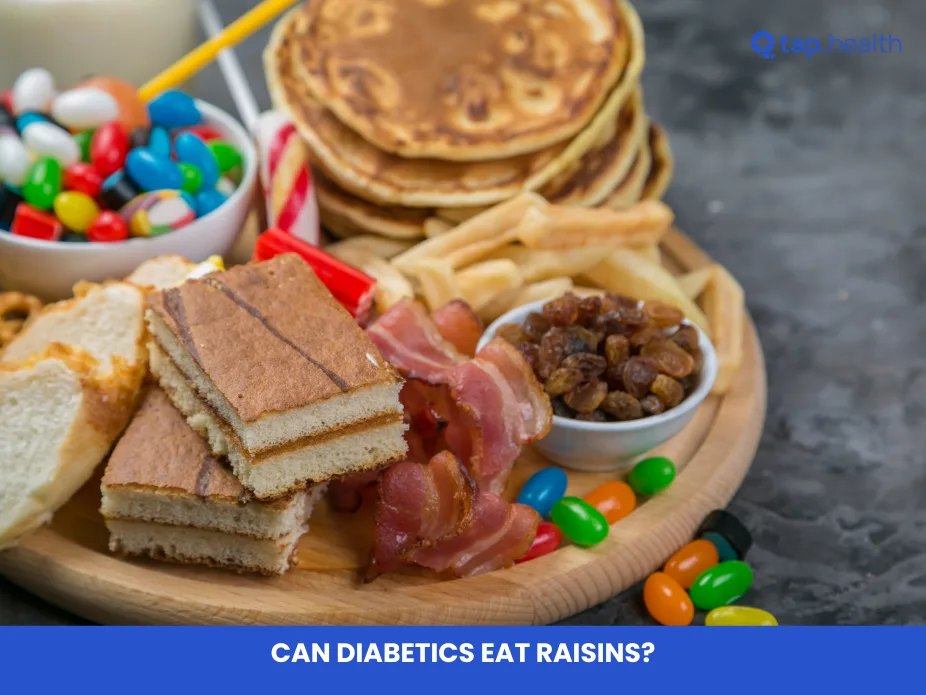If you have diabetes, choosing the right foods is critical to managing your blood sugar and overall health. Raisins, those small, sweet dried grapes, are a popular snack, but you may wonder: Can diabetics eat raisins? Are they safe, or could they cause a blood sugar spike?
In this post, we’ll explore everything you need to know about raisins and diabetes. We’ll cover their nutritional content, their impact on blood sugar levels, their health benefits, and provide expert tips on how to enjoy raisins safely if you have diabetes.
By the end of this article, you’ll have a better understanding of whether raisins can be a part of a diabetes-friendly diet, how to manage portions, and some healthier alternatives.
What Are Raisins? A Quick Overview
Raisins are dried grapes, and they come in various varieties, such as golden raisins, black raisins, and sultanas. They’re commonly consumed as snacks, in baked goods, and mixed into cereals, salads, or yogurt.
Raisins are naturally sweet, with most of their sugar coming from the natural sugars found in grapes. Despite their small size, they pack a punch when it comes to calories, carbs, and sugar. A small serving of raisins can be nutrient-dense, but it’s essential to manage portion sizes, especially for diabetics.
Nutritional Breakdown of Raisins
To better understand how raisins affect blood sugar, let’s first take a look at their nutritional profile. Here’s the approximate content for a standard serving of raisins (1/4 cup or 40 grams):
- Calories: 120
- Carbohydrates: 32 grams
- Fiber: 1.6 grams
- Sugars: 29 grams
- Protein: 1 gram
- Fat: 0.1 grams
Raisins are a rich source of natural sugars, which is a concern for anyone managing diabetes. However, they also provide fiber, which can slow down the absorption of sugar, and potassium, which helps regulate blood pressure. Despite their sugar content, raisins have health benefits when consumed in moderation.
How Do Raisins Affect Blood Sugar?
When considering foods for a diabetic diet, the glycemic index (GI) is a key factor to watch. The glycemic index measures how quickly a food raises blood sugar levels after consumption. Foods with a high GI can cause a quick spike in blood sugar, while foods with a low GI result in a slower, more controlled rise.
Raisins have a moderate GI, with a typical value between 50 and 60. This means they don’t cause as rapid a spike in blood sugar as higher-GI foods, like white bread or sugary candies. However, because they are still a source of natural sugar and carbs, portion control is important to avoid blood sugar spikes.
The Role of Fiber
One of the positive aspects of raisins is their fiber content. Fiber plays an essential role in regulating blood sugar because it helps slow down the digestion and absorption of carbohydrates. This makes raisins a better option than foods that are high in refined sugar but low in fiber. However, they should still be consumed carefully, especially if you are on insulin or have type 1 diabetes.
Can Diabetics Eat Raisins? Yes, but with Moderation
The short answer is yes, diabetics can eat raisins, but they should be consumed in moderation. Here’s why:
Benefits of Raisins for Diabetics
- Rich in Nutrients: Raisins contain essential vitamins and minerals, such as potassium, iron, and antioxidants, which can improve overall health. Potassium helps regulate blood pressure, and antioxidants can fight inflammation, which is important because people with diabetes are at an increased risk of cardiovascular diseases.
- High in Fiber: The fiber in raisins can help control blood sugar levels by slowing down the rate at which sugars are absorbed into the bloodstream. This can help prevent large fluctuations in blood glucose.
- Natural Energy: Raisins can provide a natural energy boost, making them a great snack before or after a workout. The carbohydrates in raisins can be beneficial for refueling, but portion control is key to avoid a blood sugar spike.
- Better Than Processed Sugary Snacks: Raisins are a much healthier alternative to processed snacks loaded with refined sugar. They offer natural sweetness along with added nutritional value, unlike candy or sugary snacks that contribute empty calories.
Risks of Eating Raisins for Diabetics
- High Sugar Content: While raisins contain natural sugar, they still have a high glycemic index and can lead to increased blood sugar levels if eaten in large amounts. It’s important to be mindful of serving sizes.
- Calorie-Dense: Because raisins are dried fruit, they are more calorie-dense than fresh grapes. Overeating raisins can lead to excess calorie consumption, which might contribute to weight gain or affect your diabetes management.
Read our blog – Can Diabetics Eat Grits? Everything You Need to Know
Real-Life Scenarios: How Diabetics Can Safely Enjoy Raisins
Let’s look at a couple of real-life scenarios of how diabetics can include raisins in their diet while managing their blood sugar levels.
Scenario 1: Lisa’s Mid-Morning Snack
Lisa is a 45-year-old woman with Type 2 diabetes. She has learned that snacking on foods like raisins can cause her blood sugar to rise if she doesn’t monitor her portions. Lisa enjoys raisins but only eats 1 tablespoon (about 10 grams) at a time. She pairs it with a handful of unsalted almonds to slow down the sugar absorption. After measuring her blood sugar, she finds that this small snack helps her feel satisfied without causing a spike.
Scenario 2: Mark’s Healthy Breakfast
Mark, 50 years old and living with Type 1 diabetes, loves adding raisins to his oatmeal. However, he used to pour a large handful of raisins into his bowl, leading to elevated blood sugar after breakfast. Mark now limits his raisins to 1 tablespoon and combines them with unsweetened almond milk and flaxseeds, both of which help stabilize his blood sugar. This balanced meal keeps him full and steady until lunchtime.
Expert Contributions: Can Diabetics Eat Raisins?
According to Dr. David Joffe, a board-certified endocrinologist and diabetes expert, diabetics can include raisins in their diet as long as they practice portion control. He emphasizes the importance of balancing raisins with other foods that can help stabilize blood sugar levels, such as protein or healthy fats.
Dr. Joffe explains that, although raisins have natural sugars, they are also packed with beneficial antioxidants, vitamins, and minerals. The key is to consume them in moderation and avoid pairing them with highly processed or sugary foods, which can cause large blood sugar spikes.
Tips for Including Raisins in a Diabetic Diet
If you’re thinking about adding raisins to your diet, here are some expert tips for incorporating them in a way that minimizes the impact on blood sugar:
- Portion Control: Stick to a small serving, such as 1 tablespoon (about 10 grams), to avoid consuming too many carbs at once. If you’re craving a bit more, pair raisins with a high-protein food like nuts or cheese.
- Balance with Protein or Healthy Fats: Pair raisins with a protein source or healthy fats to slow down the absorption of sugar. For example, adding raisins to a salad with avocado or mixing them with a handful of almonds can help balance out their sugar content.
- Choose Unsweetened Raisins: Some raisins are coated with added sugar or sweeteners. Always look for unsweetened raisins to avoid extra sugar intake.
- Use Raisins in Cooking or Baking: Raisins can be used in homemade granola bars, muffins, or as a topping for salads and yogurt. By combining them with other nutritious ingredients like oats, whole grains, or low-fat dairy, you can create a balanced snack or meal.
- Monitor Blood Sugar Levels: Keep track of how your blood sugar reacts after eating raisins. This can help you understand how they affect you personally and guide you in adjusting your diet accordingly.
Healthier Alternatives to Raisins for Diabetics
If you’re looking for other healthy snack options, here are a few alternatives that are also great for managing blood sugar:
- Nuts and Seeds: Almonds, walnuts, and chia seeds are excellent choices. They’re low in carbs, high in fiber, and provide healthy fats that help stabilize blood sugar levels.
- Fresh Berries: Strawberries, blueberries, and raspberries are naturally low in sugar and high in fiber and antioxidants, making them great alternatives to raisins.
- Greek Yogurt: Low-fat or non-fat Greek yogurt is high in protein and contains beneficial probiotics that support gut health.
- Cottage Cheese with Berries: Cottage cheese paired with fresh or frozen berries offers a satisfying snack that’s rich in protein and fiber.
FAQ on Can Diabetics Eat Raisins?
1. Can diabetics eat raisins?
Yes, diabetics can eat raisins in moderation. Raisins provide fiber, antioxidants, and essential nutrients but should be eaten in small portions to avoid blood sugar spikes.
2. Are raisins high in sugar?
Yes, raisins are naturally high in sugar. A small serving (1/4 cup) contains about 29 grams of sugar, so portion control is essential for diabetics.
3. How can diabetics enjoy raisins safely?
Diabetics can enjoy raisins safely by eating small portions (1 tablespoon), pairing them with protein or healthy fats, and monitoring blood sugar levels after consumption.
4. Can raisins cause a blood sugar spike?
Yes, raisins can raise blood sugar due to their sugar content, but their moderate glycemic index means they don’t cause rapid spikes like high-GI foods. Still, portion control is crucial.
5. What are some healthier alternatives to raisins for diabetics?
Healthy alternatives include fresh berries, nuts, seeds, Greek yogurt, and cottage cheese with berries—these options are lower in sugar and high in fiber.
In conclusion, raisins can be part of a diabetic-friendly diet if consumed mindfully. Their natural sugars, fiber, and antioxidants can offer health benefits, but portion control is key. By following expert advice and pairing raisins with other foods that help balance blood sugar levels, diabetics can safely enjoy this delicious snack.
For more information on managing diabetes and nutrition, visit the American Diabetes Association.





